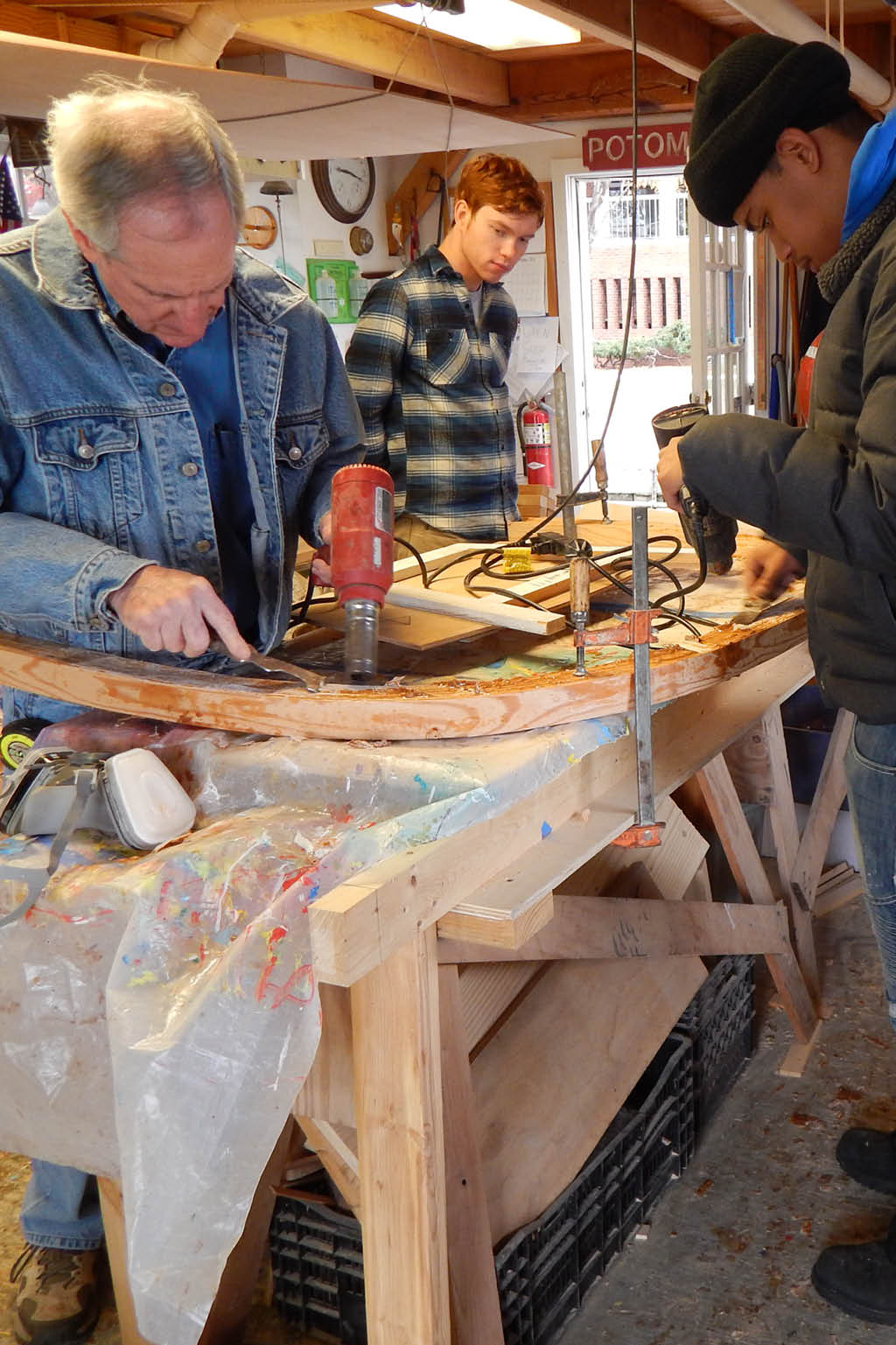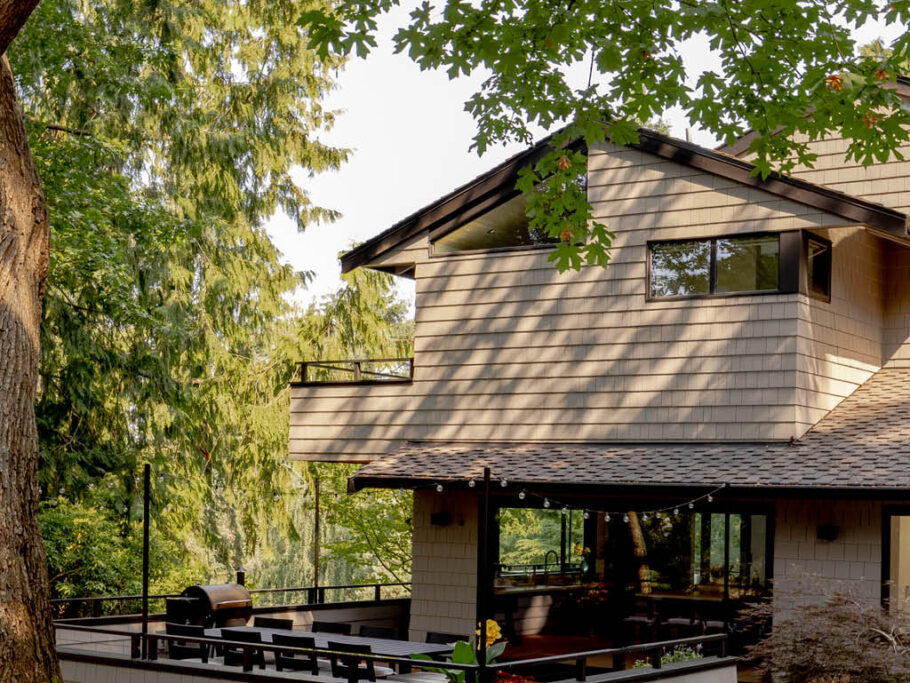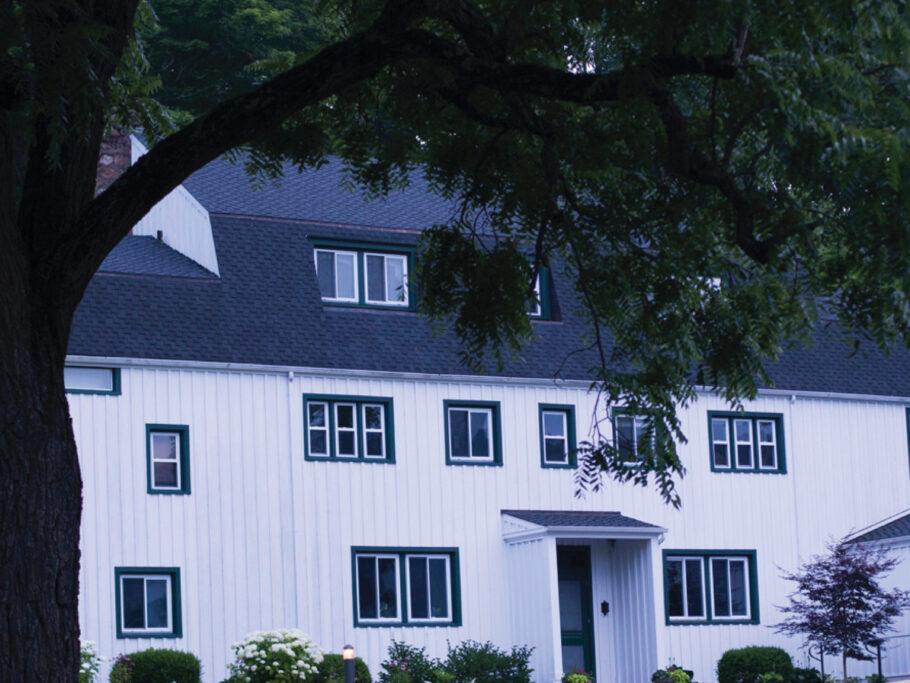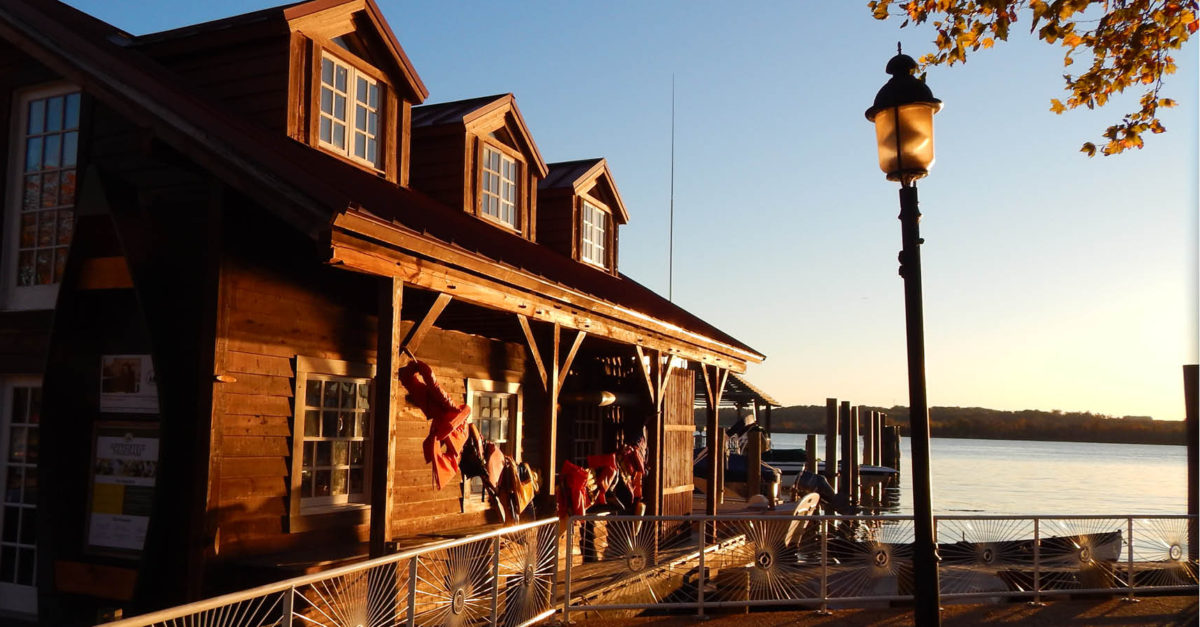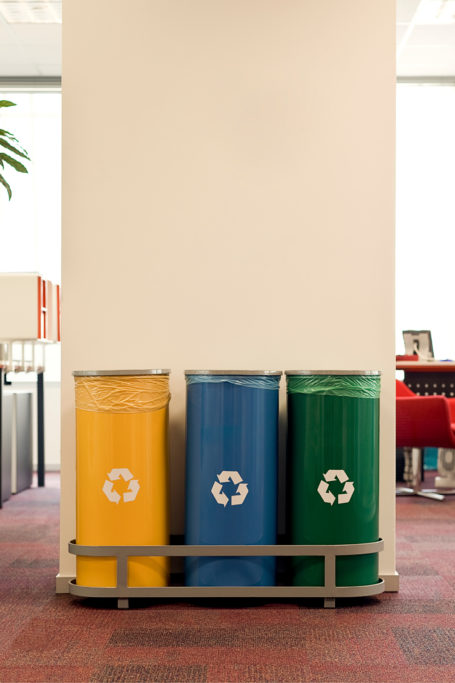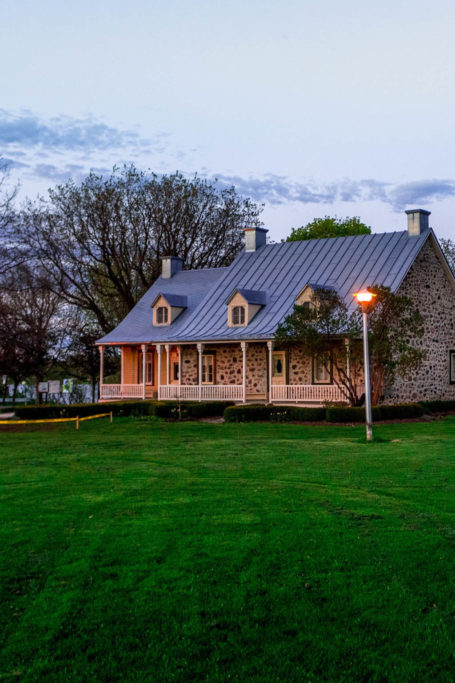Building Boats, Crafting Confidence
By age seventeen, Darrel had hit some troubled waters. He found himself locked up and spent the next two years incarcerated. While at a halfway house, his parole officer recommended a different path. He followed it. “I came here the day after I left there,” Darrel recalls.
The place he landed was the Alexandria Seaport Foundation (ASF) boat shop in was tasked with involved tools and techniques uncommon to most people his age. Words of their lexicon. “It was overwhelming,” much stuff you have to figure out.”
It can be grueling and, after working for hours on a project, sometimes mishaps occur, such as a curved piece of plywood snapping. It isn’t fair. But achieving fairness here takes on multiple and significant meanings. Young people like Darrel who are accepted into ASF’s apprentice program learn that making their work “fair” in boatbuilding means each plank is smooth and flush. It’s a long and tedious process, yet it’s an exercise that is necessary to develop confidence in boat construction—and in life.
The nonprofit ASF offers at-risk youth ages eighteen to twenty-four an opportunity to reset their future course. It began in 1982 as an organization to preserve Alexandria’s maritime history. Eleven years later, it recognized that boatbuilding could be a vehicle for improving lives. According to executive director Steve Mutty, its mission remains “to instill discipline, academic knowledge of the craft of boatbuilding, and very importantly, life skills.”

© Elizabeth Bellizzi.
Most apprentices complete the full-time program, which provides a stipend, in six to eight months. They learn the basics of various woodcuts and wood science, and then they progress to a final project. For some, that capstone project involves boatbuilding or boat refurbishing.
While ASF is focused on the future for its apprentices, so much of what it does is rooted in its past. In a nod to the city’s waterfront significance, its primary boat of choice to construct is the dory. After the Civil War, the oyster industry along the Potomac River boomed, and local watermen sought a stable vessel that could navigate shallow water. The flat-bottomed dory boat was the solution.
To some, this mode of transportation is more than part of a profession. For example, French anthropologist and author Jacques Ivanoff believes “the boat is the most living cultural object ever known.” Despite this significance, Mutty and his staff are realistic about the market for traditional boatmaking skills. Therefore, they dovetail this training with lessons that will help the apprentices to be not only job ready but also, as he says, “life ready.” This approach means that ASF takes a glass-half-full premise with every new apprentice. “We receive these kids with the assumption that they are as good as the next person, but that goodness is locked away, and we unlock it,” Mutty says.
With approximately seven hundred apprentice graduates to its credit, ASF’s method for nurturing potential works. In traditional boatbuilding, the lofting process—drawing the lines of the hull at full size—must be done every time. Each boat is different. So, too, is every apprentice. Thus, each is afforded the opportunity to progress at his or her own pace.
In woodworking, as in life, there will be mistakes and bumps along the way. Some apprentices are quicker to adapt to the routine and time management needed to be a successful boatbuilder. Others deal with personal relationship issues. However, it’s these “teachable moments,” apprentice program lead Evan Waksler says, that keep apprentices on track. Other job-readiness areas, such as résumé writing and going on interviews, are also part of the program. “It’s all about helping them help themselves,” Waksler says.

© Elizabeth Bellizzi.
The common thread among the apprentices is a desire to change. The first step toward transformation begins with simple tasks. Longtime volunteer Jay Creech knows just what to say to help the apprentices appreciate the value of starting small. Holding a maul completed by an apprentice, he explains how this determination takes shape: “If you look at the joinery in here, he’s taken a piece of hardwood that mates the side. Then he’s got a split down the middle in both directions where he drives wedges in there with a little glue, so this isn’t going to come apart. That’s equal to professional joinery. That’s building your confidence. You’ve done a craftsman’s job by learning those steps.”
In 2014, this craftsmanship garnered the attention of the nation’s leading maritime museum, Mystic Seaport, in Mystic, Connecticut. ASF apprentices, volunteers, and staff constructed one of the ten commissioned whaleboats that equipped Mystic’s 1841 whaleship, the Charles W. Morgan, a National Historic Landmark, as it embarked on its thirty-eighth voyage. This level of recognition by the historic maritime community was made possible in large part because of the quality of ASF volunteers. In addition to Creech, the apprentices train with professional craftsmen, some of whom create custom work on high-end homes. Mentorship of this caliber helps the apprentices become valuable hires in not just carpentry but other
trades as well.
What I like to do with these kids is take them aside, walk back to what they worked on that day, and say, ‘This was yours.’
For Creech, reminding the apprentices of each day’s effort is part of the formula for success. “What I like to do with these kids is take them aside, walk back to what they worked on that day, and say, ‘This was yours.'”
This plank fits like a charm, the way it’s supposed to fit,’ and make them think about what they’ve accomplished and encourage them to take pride in getting it done right,” Creech says.
Sometimes that is easier said than done. Given the amount of math in the apprentice program, a project can have more knots than expected. While some might have a creative plan, it’s the measuring and the fractions that give them pause. ASF recognized this hurdle and responded by creating a middle school math initiative to reach kids before they are impacted later in life.
“Statistically, when kids at the middle school level start to slip in math, it’s a slippery slope for everything else,” Mutty says. “They start to lose confidence and begin failing other classes, and that can be a gateway to a whole variety of negative events, such as dropping out of school or getting involved in gangs or drugs. So, by getting in there and using project-based learning in the shop classes, we’re really able to improve their math proficiency,” he says.
In collaboration with teachers from Alexandria City and Arlington Public middle schools, an ASF middle school math instructor works two days a week with students who are struggling with the subject. The aim is to provide them with hands-on woodworking projects designed to strengthen their math and critical-thinking skills. According to Mutty, “Better than 90 percent of the kids who we work with improve their math skills.”
During the thirty-five years since its inception, ASF, too, has progressed. As Alexandria supported its maritime industry hundreds of years ago, that same community spirit is helping to bolster a new generation of builders today.
One night a week during open shop, everyone is welcome. It’s a chance for the public to work on projects with the apprentices or bring their woodworking creations that might require ASF’s machines and tools. It’s about giving back, learning from others, and offering support.

© Elizabeth Bellizzi.
The altruism shown to local woodworkers is not a one-way street. The commitment of the apprentices to their work, to their community, and to their future is recognized with every job offer they receive from area businesses. “The apprentices really do help comprise the fabric of Alexandria by virtue of the fact that they’re working in our community,” Mutty says. “We’re helping to make them productive, job-ready citizens who are out in the community not only working but also volunteering. One of our aspirations is to make sure that the apprentices are leaving with an appreciation for going out and doing their own good works in the community.”
A twenty-year redevelopment plan is underway for the city’s waterfront district. “Alexandria,” it states, “should be understood as an expression of the American story.” This same summary could be applied to ASF’s work. Its efforts to find a local solution to a national problem is typical of American ingenuity.
One person who appreciates this sentiment is Darrel. With a pleasant demeanor and a genuine smile, he recounts with pride refurbishing a boat prior to graduating from the apprentice program. A commissioned project, it is part of the decor in Chadwicks restaurant, an Alexandria fixture since 1967. “That was my last important project I did before I left,” he says.
Sometimes the most significant acts occur through everyday moments. In Darrel’s case, it was a conversation between two acquaintances. While catching up with regular clients, Chadwicks owner Trae Lamond mentioned his desire to have a nautical themed item hang above the grand wooden staircase, and one of the patrons had a friend who worked at ASF. The connection was made.
Lamond selected a boat in the ASF warehouse that had seen better days. Longtime ASF supporter and volunteer David Painter, who also was a Chadwicks regular, worked with Darrel on this project. Its owner described the final product as “a beautiful little boat.” Sadly, Painter passed away shortly after the boat was completed, so in tribute to this much-loved volunteer, Painter’s friends at ASF added his initials on nautical flags to the bottom of the boat. It was, as Mutty strives for, an opportunity for the apprentices to do good works in the community.
When Darrel is asked about his future, the expected response is that he would continue his successful start in the carpentry field. Yet, just as he was given another path in life a few years ago, once again, he is taking a different turn. “I’m hoping to go to school for social work. I really want to work with at-risk youth, like teens with troubled backgrounds,” he says. His selflessness is the result of what all apprentice graduates receive from the Alexandria Seaport Foundation program—confidence.
For more info, visit alexandriaseaport.org.
